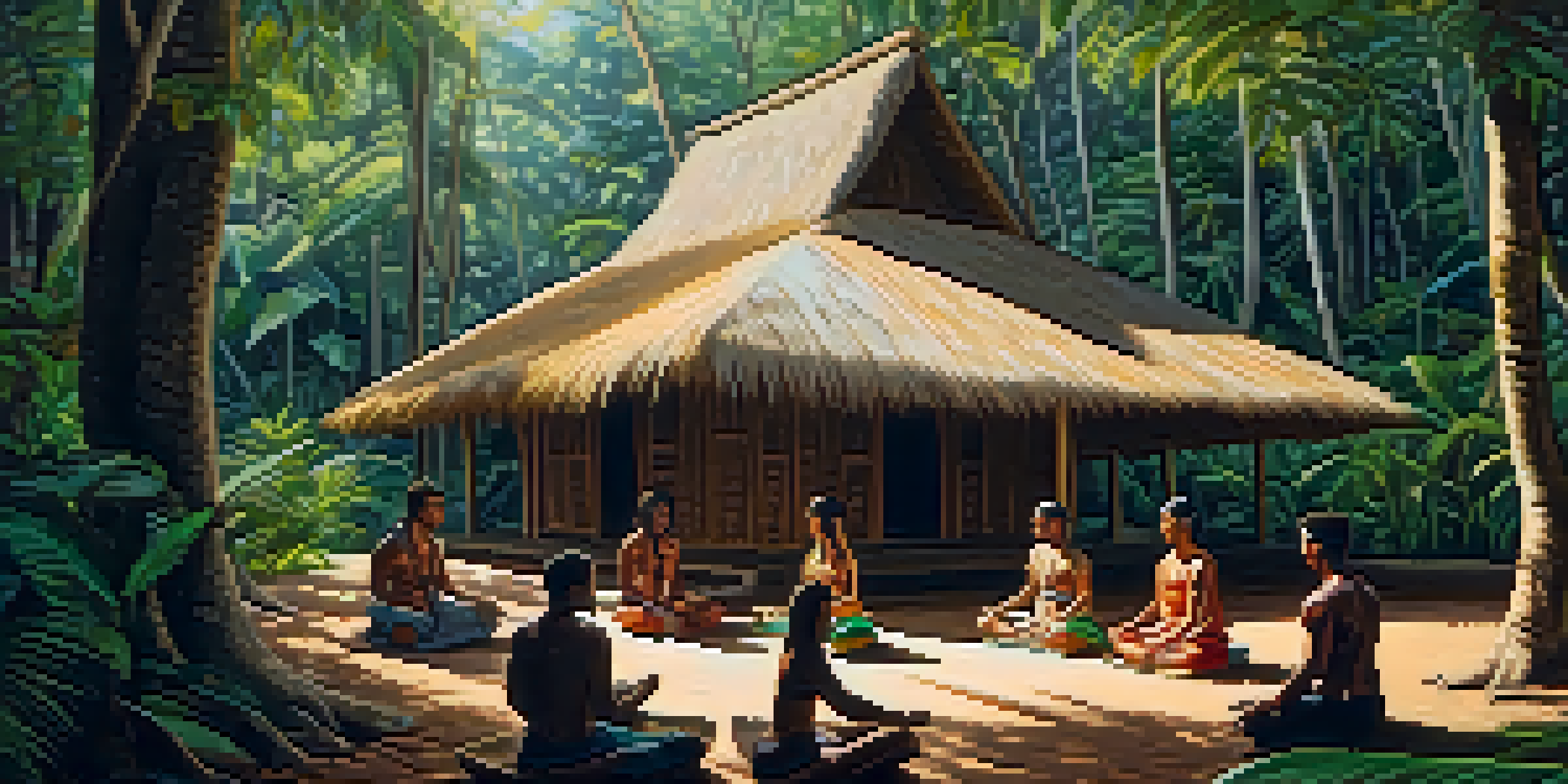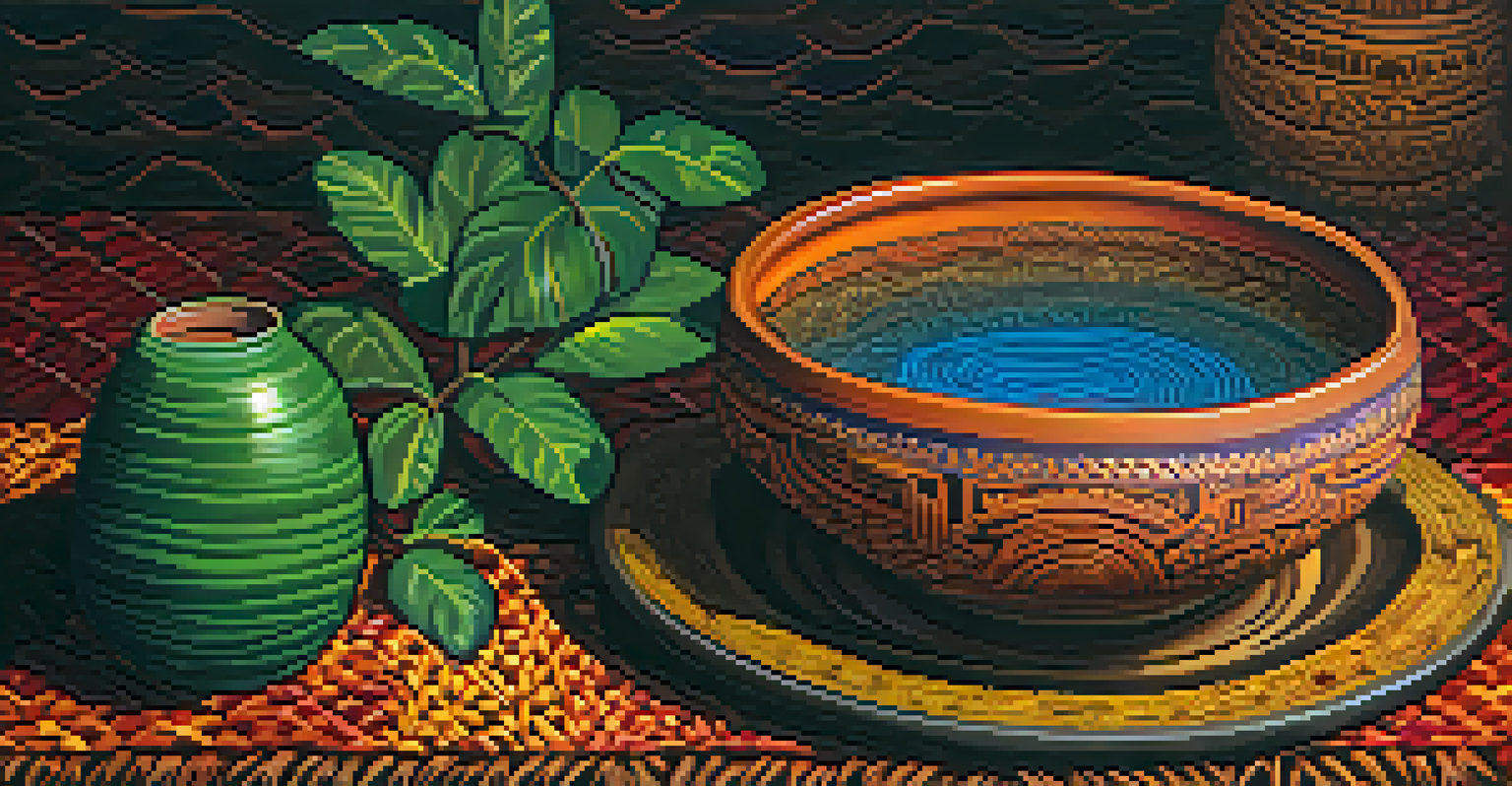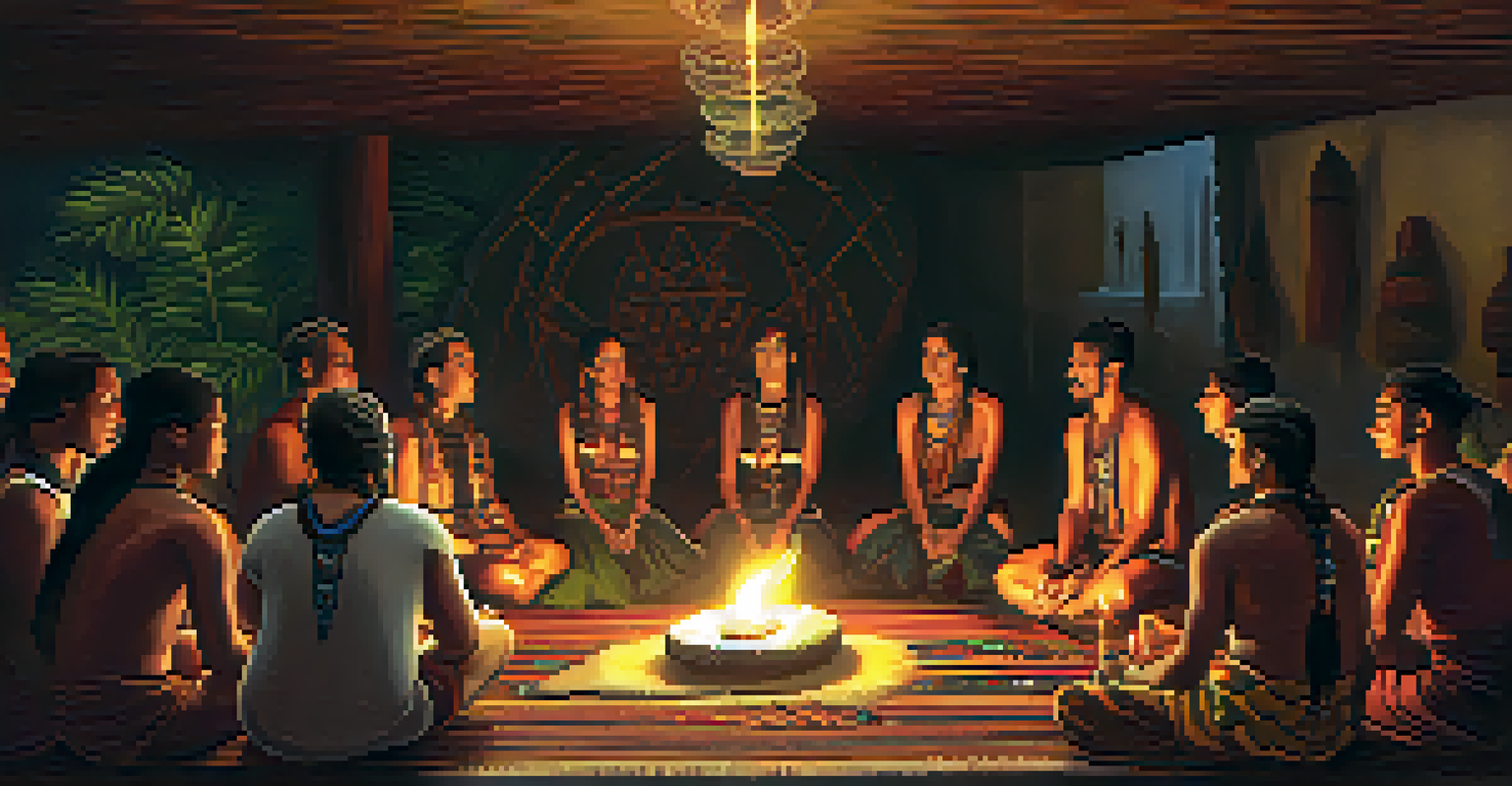Healing Journeys: Ayahuasca Retreats in Contemporary Culture

Understanding Ayahuasca: A Brief Overview
Ayahuasca is a powerful brew made from the Banisteriopsis caapi vine and other plants, traditionally used by indigenous tribes in the Amazon. This concoction is known for its psychoactive properties, primarily due to the presence of DMT, a compound that can induce profound spiritual experiences. For many seekers, Ayahuasca represents more than just a hallucinogen; it’s a doorway into deeper self-awareness and healing.
The experience of Ayahuasca is like a mirror held up to your soul, reflecting all that you are and all that you can be.
The ritual of consuming Ayahuasca often occurs in a ceremonial setting, guided by an experienced shaman. This sacred context is essential, as it creates a safe space for participants to explore their inner landscapes. The process can be challenging, yet it often leads to transformative insights, making it a popular choice for those seeking personal growth.
In contemporary culture, the interest in Ayahuasca has surged, attracting people from various backgrounds. This growing fascination speaks to a universal desire for healing and connection, highlighting how ancient practices resonate with modern life.
The Rise of Ayahuasca Retreats Worldwide
In recent years, Ayahuasca retreats have popped up around the globe, from the Amazon rainforest to wellness centers in Europe and North America. These retreats offer structured experiences, often combining traditional practices with contemporary wellness philosophies. The allure of such retreats lies in their promise of profound personal transformation, drawing in participants from all walks of life.

Many retreat centers provide a comprehensive approach that includes not just the Ayahuasca ceremony, but also integration sessions, yoga, and meditation. This holistic model aims to support participants throughout their journey, addressing both the spiritual and practical aspects of healing. As a result, attendees often leave feeling rejuvenated and more connected to their true selves.
Ayahuasca: A Path to Healing
Ayahuasca offers profound spiritual experiences that can lead to personal growth and deeper self-awareness.
However, the commercialization of Ayahuasca retreats raises questions about authenticity and cultural appropriation. It’s essential for participants to choose retreats that honor the traditions and practices of indigenous cultures, ensuring a respectful and genuine experience.
Personal Stories: Healing Through Ayahuasca
Many participants share powerful testimonials about their Ayahuasca experiences, often describing initial skepticism followed by profound revelations. For example, someone struggling with anxiety might find that the ceremony uncovers deep-seated fears, leading to a transformative understanding of their emotions. These narratives highlight the potential of Ayahuasca to catalyze healing and personal growth.
Ayahuasca is not a cure; it is a doorway to healing that requires both courage and commitment to walk through.
One common theme in these stories is the sense of interconnectedness that participants often report. Many describe feeling a deep bond with themselves, others, and the universe during the experience. This newfound perspective can lead to lasting changes in how they approach their relationships and life choices.
However, it’s important to note that not everyone has a positive experience; some may encounter challenging emotions or difficult memories. This unpredictability underscores the importance of approaching Ayahuasca with respect and readiness for whatever may arise.
The Science Behind Ayahuasca Experiences
While the spiritual aspects of Ayahuasca are often emphasized, there is a growing body of scientific research exploring its effects. Studies suggest that Ayahuasca can lead to increased psychological resilience, reduced symptoms of depression, and enhanced emotional processing. This scientific validation adds credibility to the anecdotal evidence shared by participants.
Researchers are particularly interested in how Ayahuasca interacts with the brain, as it appears to promote neuroplasticity—the brain's ability to reorganize itself. This could explain why many participants report lasting positive changes in their mental health and outlook on life. Understanding these mechanisms can help bridge the gap between traditional practices and modern therapeutic approaches.
Importance of Integration
The integration process after Ayahuasca ceremonies is crucial for translating insights into meaningful life changes.
As interest in Ayahuasca grows, scientists are also advocating for more rigorous studies to ensure its safe use. This includes examining the potential risks and benefits, which is crucial for integrating plant medicine into contemporary mental health care.
Integration: The Key to Lasting Change
One of the most critical aspects of participating in an Ayahuasca retreat is the integration process that follows. After such intense experiences, individuals often need support to make sense of their insights and emotions. This is where integration circles and therapy come into play, providing a safe space to discuss and ground these revelations in everyday life.
Integration helps participants translate their experiences into actionable changes, whether that’s improving relationships, pursuing new passions, or simply adopting healthier habits. Many retreat centers emphasize this step, recognizing that the journey doesn’t end with the ceremony. Instead, it’s just the beginning of a longer healing process.
Without proper integration, the insights gained during the ceremony can fade, leaving participants feeling lost or confused. Thus, fostering a supportive community can be vital for maintaining the positive changes initiated by Ayahuasca.
Cultural Considerations: Respect and Responsibility
As Ayahuasca retreats gain popularity, it’s crucial to approach them with cultural sensitivity and respect. The practices surrounding Ayahuasca have deep roots in indigenous traditions, and it’s essential to honor these origins rather than exploit them for profit. Participants should strive to learn about the cultural significance of Ayahuasca and seek out retreats that prioritize indigenous wisdom.
Supporting indigenous practitioners and communities is one way to ensure that Ayahuasca is used responsibly. This might involve choosing retreats that are run by trained shamans who respect the traditional practices and values associated with Ayahuasca. Engaging with these communities can also provide deeper insights into the spiritual and cultural contexts of the experience.
Cultural Respect is Essential
Participating in Ayahuasca retreats requires a commitment to cultural sensitivity and honoring indigenous traditions.
Ultimately, approaching Ayahuasca with gratitude and humility can enhance the experience. Recognizing the wisdom embedded in these traditions fosters a respectful relationship with the medicine and its cultural roots.
The Future of Ayahuasca in Modern Healing Practices
Looking ahead, Ayahuasca’s role in modern healing practices is likely to continue evolving. As more people seek alternative therapies for mental health and personal development, there may be an increased demand for Ayahuasca retreats. This could lead to further integration of plant medicine into therapeutic frameworks, potentially benefiting those who have not found relief through conventional methods.
However, with this growth comes the responsibility to maintain the integrity of the practice. Ensuring that retreats prioritize safety, authenticity, and cultural respect will be crucial in shaping the future landscape of Ayahuasca use. As the conversation around mental health continues to expand, integrating traditional wisdom with modern practices can create holistic approaches to healing.

Ultimately, the future of Ayahuasca in contemporary culture will depend on how practitioners, participants, and communities navigate these changes. By fostering a culture of respect and understanding, we can ensure that Ayahuasca remains a powerful tool for healing and transformation.